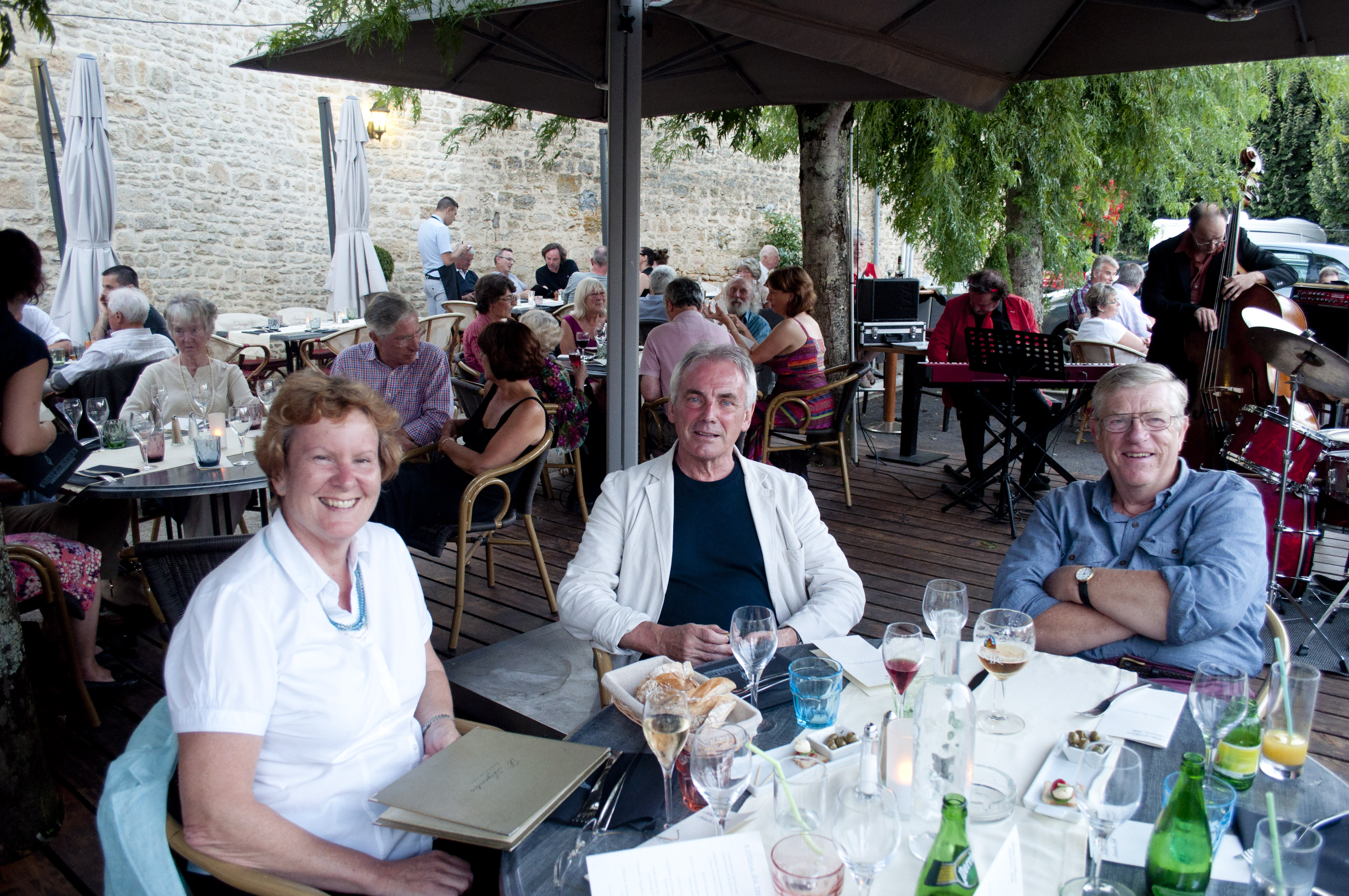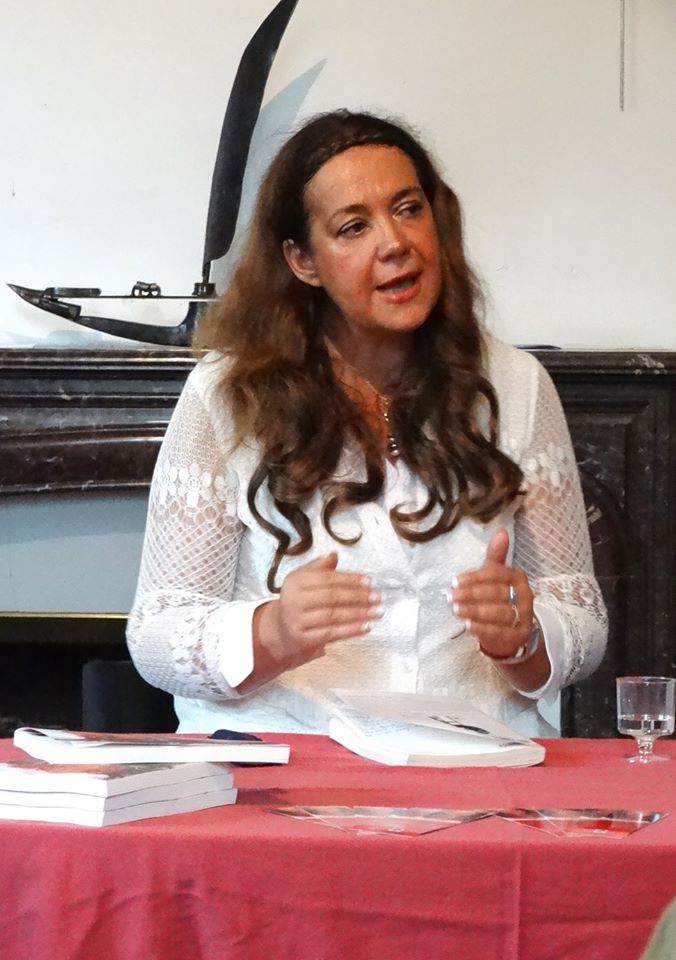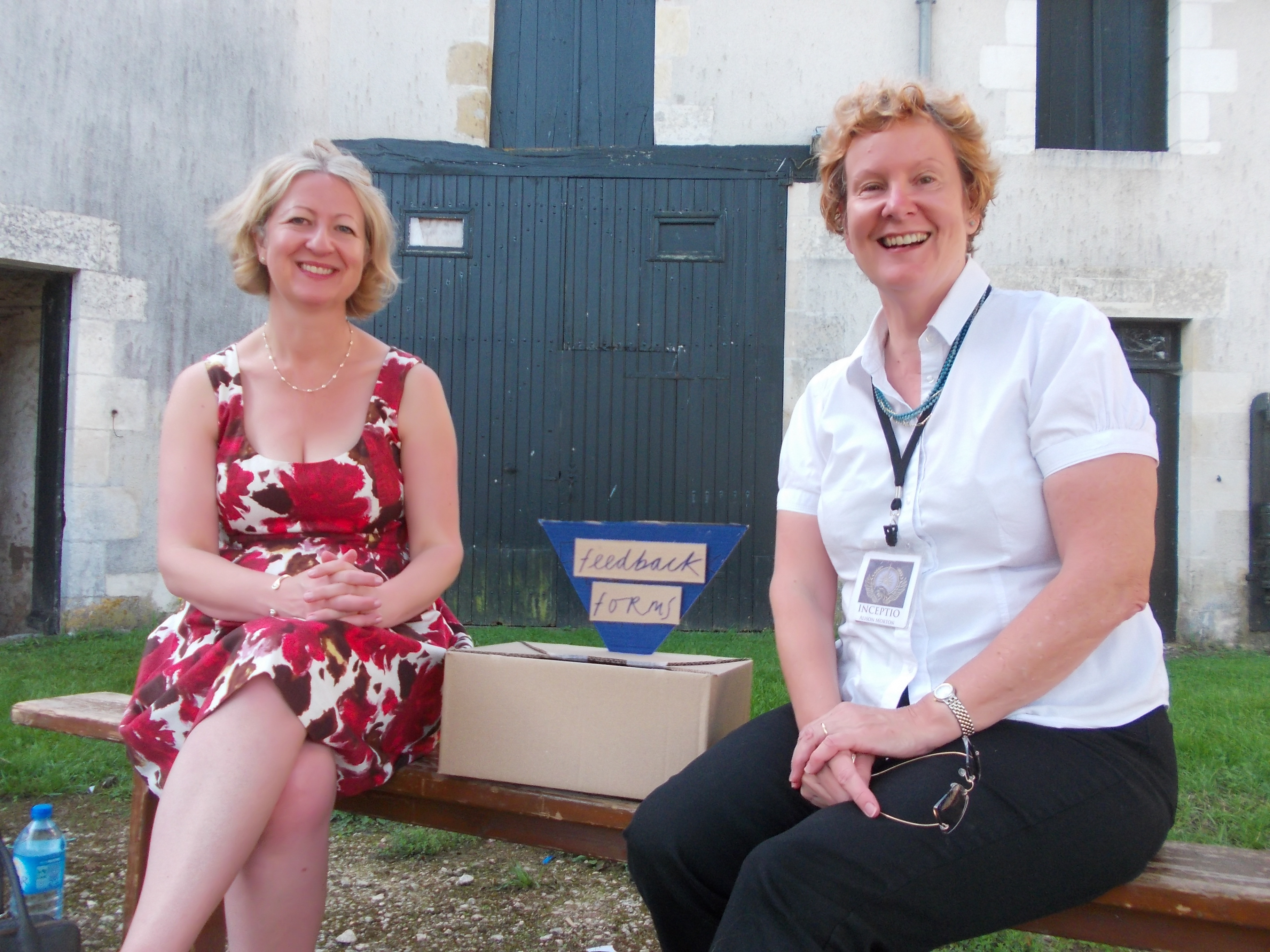What was it about the Charroux Literary Festival that made it special? Why do we go to any Literary Festival and what can we learn from these occasions? Held in the Medieval town of Charroux, this was the first Charroux Litfest: a memorable occasion, where I not only met a number of other wonderful authors, but I also gained a lot of valuable inspiration, which I’m looking forward to sharing here.

Why go to a Literary Festival?
For authors and for readers, Literary Festivals are an opportunity to meet other like-minded people and what was wonderful about Charroux was the incredible sense of community. A spirit of generosity permeated the occasion. This wasn’t one of those festivals where authors swish in and swish out, only briefly leaving their ivory towers to touch base with their public, but rather an environment where authors and readers hung out together: new friendships and bonds were made quickly in the gardens of La Maison du Pays.
At Charroux, I had an opportunity to connect more closely with my colleagues including Stephanie Zia, Diana Morgan-Hill and Barry Walsh, as well as forging new friendships with fellow authors and poets Alison Morton, Kate Mosse, Elizabeth Haynes, Isabel Ashdown, and Katherine Gallagher, as well as the amazing organisers, also writers, Kate Britten and Chris Collette. There were many others, too many to name – but I will be writing a separate special post about the women who attended my writers’ networking lunch. It’s always such a pleasure to bring serious writers together, one of the most satisfying aspects of my work.
My own workshop focused on visual and historical inspiration:

The essence of my talk related to organic growth, something I often discuss with students and clients and refer to in more depth in my ebook about productivity and confidence for writers, Get Black on White. I considered how particular images have inspired my work: many of my books came from tiny fragments of ideas and my aim was to encourage others to trust their hunches about the fragments of information – visual and verbal – that fascinate them.
The inspiration for my novel Bluethroat Morning for example was an image that I’d written about in a discarded draft of an earlier work: I imagined a woman walking along the beach in Cley, Norfolk, during the Victorian era, wearing a bustle dress, accompanied by her wheezing father. I couldn’t get that image out of my mind, yet I was now writing a contemporary novel – how might this matter to that book? I wanted to explore how we honour these impulses and make sense of them during the process of the work. Afterwards, it was a pleasure to work with some of the attendees in a post-talk workshop where we developed character portraits inspired by paintings.
What did I learn at the Charroux Festival?
Most importantly, I was reminded of the incredible community that can exist amongst writers at every stage of their careers. There were so many wonderful aspects of the programme. One highlight was the talk given by bestselling author Kate Mosse, author of the Labyrinth trilogy and most recently The Taxidermist’s Daughter. Kate gave many insights into her writing processes.

She used the metaphor of the stage to describe her methods:
I build my stage sets first… I stand on the empty set and I’m aware of the characters in the wings… I start writing and little by little, they come out of the room. But they mustn’t come out too soon… and then there’s a joyous moment and then they step forward and I know who they are.
Kate is an inspirational powerhouse. She clearly works long hours to get her novels just right. She spends three-quarters of her time researching the novel, then a quarter of the time writing it – which given the length of her novels, suggests an idea of the hours that she puts in. Kate’s passion for France and Carcassone in particular shone through. She is without doubt the author to read if you want to see how a writer uses a fascination with sense of place in her stories.

One session which I found extremely interesting was the Crime Panel. However I was hugely frustrated to be slightly unwell during the festival: those who saw me in tears on the streets of Charroux (thank you Stephanie Zia for buying me tea when I most needed it!) will know it was down to the sheer irritation that I had to leave the Crime Panel early and to miss Isabel Ashdown’s session due to illness. I took a walk to the hilltop, hoping that the air would help me to prepare for my own session, but eventually only a quiet meditation helped me to carry on, despite splitting headache and nausea – what bad timing!
Luckily I did eventually rally! Here I am the following day with the wonderful Alison Morton, author of the Roma Nova thrillers. Harriet Springbett took this lovely shot – her post on the festival is here.
I learned so much from Alison and the other authors who took part in the Crime Panel, Elizabeth Haynes and Christine Collette. In particular I was inspired by the feminist thread of the conversation. Alison talked about the need for us to have more stories with strong women leaders and how few authors passed the ‘Bechdel test’, whereby women lead the plot, and in the context of crime fiction discuss procedure and run the investigations. There was also an interesting conversation about the difference between satisfactory conclusions in real life versus fiction: in real life, Elizabeth said, successful prosecution is the ‘successful outcome’ whereas in fiction it might be more akin to ‘poetic justice’.
Alison and I had some great conversations about the life of the independent author and the business of being a novelist. As she says in her own blog post on the festival, we spent a fabulous afternoon relaxing in the gardens of La Maison du Pays together with author Barry Walsh, talking about the writer’s life with a bit of politics thrown in. One example of Alison’s wisdom is the way that she treats reader reviews. “Every review is like a gift” she says – she uses the feedback to consider her work through fresh eyes.
Two other highlights for me were Barry Walsh‘s talk about memory and fiction based on real life and ‘An Evening with Diana Morgan-Hill’. Barry was once a student on my fiction-writing course at Richmond Adult College and I’m so proud that he began his novel The Pimlico Kid in that class. He talked about the relationship between fiction and memory and it was a pleasure to listen to his accomplished readings from the novel.

Diana Morgan-Hill‘s story is a remarkable one. I first worked with Diana around 10 years ago when she was writing a novel, but she has recently published her memoir Love & Justice: A Compelling True Story Of Triumph Over Tragedy. At the Charroux Literary Festival Diana spoke with huge courage and insight about her story. Aged 29, she fell under a London train and within 7 seconds she was transformed from busy woman of the world with everything to live for to a double-leg-amputee, her life in ruins. Her memoir is a compelling tale not only of the effects of this accident but of her 5 year battle with British Rail who astonishingly threatened to prosecute her for trespassing on the tracks. Diana is a remarkable performer and she had the audience hanging on her every word and laughing at her wonderful humour.

What next?
Whenever I attend a literary event, I always come away hugely inspired and ready to try new approaches to my writing and business routines. Here are my key thoughts post-Charroux:
1. Early to bed, early to rise: Kate Mosse begins at 4am (I’m not planning to be quite that disciplined but a girl can dream.)
2. Play around with the idea of less-focused writing – just drifting back to the writing desk to write the odd paragraph over the course of the day. This isn’t really ‘me’ – I prefer more focused stints, but I thought it would be useful to try… I took this one from Alison Morton’s booklet about the writing life.
3. Make this the year I truly focus on my Young Adult novel. I’ll continue to rewrite my play but the novel will be first priority.
4. Make sure I get my early novels in-print again!
5. Consider having a separate site about my work as a writer versus my work as a coach – I’m still uncertain about that one and would be interested in your views.
A lot of these insights emerged from my conversation with Alison – we had several long conversations over the four days!
And finally…
A huge thank you to organisers Kate Britten and Chris Collette and all those who helped set up the festival and volunteered to help run it. I so enjoyed meeting everyone and am looking forward to sharing more about my writer’s workshop and the fantastic writers I met there in the next post. Thank you also to Susie Kelly, patron of the Festival who first suggested me as a guest!
If you came to the Charroux Festival, I’d love to hear your thoughts on your experience of the event. And if you didn’t – what do you most get from your visits to literary festivals? Any particularly memorable insights?


 Join me at the Charroux Festival this summer
Join me at the Charroux Festival this summer
What a thoughtful evocation of the Charroux weekend! Apart from the the pure enjoyment of the individual events, I learnt so much from talking to other writers and readers. We had time and space to talk properly about creative as well as practical aspects of writing and publishing. And yes, Diana was screamingly funny!
So glad that you enjoyed the post Alison. As is clear from this I got so much from our conversations and it was a huge pleasure and privilege to meet you. Hope we’ll find another occasion before too long!
Just reading your post brings it all back afresh. I’m still inspired, two weeks after meeting all those lovely people.
Ah, so pleased you liked it Harriet. It was great to meet you and looking forward to keeping in touch! Wasn’t it a fantastic few days…
Great to meet you Jacqui and for sending me this post. I totally agree that it was a wonderful energising experience from all points of view. I am still raving about different aspects to members of my Limousin writers group. I look forward to keeping in touch and reading more about your coaching help.
Many thanks
Sue
It was lovely to meet you too Sue and very much looking forward to exploring your site shortly… so pleased you had such a good experience at the festival!
I really enjoyed this post, Jacqui. It reminded me of a terrific few days in Charroux, my first literary festival ever and I suspect a hard act to follow in a couple of ways.
Your blog prompted me to remember how Elizabeth Haynes had us all in stitches at the Crime Panel with her story of literary research with an erotic masseur – you had to be there, but she really could do stand-up as a sideline! – as well as your inspiration session, which was very stimulating, and the networking session you led, and thank you for that, because I know you were quite under-the-weather that day.
More generally I found huge inspiration from the environment, the festival and most of all from the easy generosity of everyone there. I wrote 2000 words of my own novel in two days. How come I don’t manage that on normal days? Hmmm.
Are women in the majority of attendees at all literary festivals? I’m attending the History Writing Festival in Harrogate in October where there are some great-sounding sessions. Really hoping that that spirit of generosity will be there too. Let’s see!
It was a pleasure to meet you Kathy and wish I’d caught Elizabeth’s ‘stand up’! Wonderful that you got some writing done while you were there and hope your progress continues apace…Would love to hear back about Harrogate… I was thinking about the female thing – there were a lot of women speakers at this festival, perhaps that had something to do with it. Although a larger proportion of my clients are female too…Enjoy Harrogate!